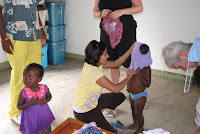One of the things I’ve definitely come to appreciate in our 3 weeks here is the art of handling young children. I’ve gained a tremendous amount of respect for friends of mine that handle children every day. The amount of energy we expend in the 4 hours with the kids is absolutely ridiculous. When we get home for lunch, it’s not uncommon for Dal or I to catch a nap to recharge. These kids are beautiful sponges who crave constant attention but have an attention-span that rivals my own. We’ve actually come up with some survival tactics while handling the kids during recess to ensure we’re not overwhelmed. Here’s an evaluation of them :
1) Ring Around the Rosey
Pros: Great for boys and girls and can be played with 3 or 30 kids.
Cons: The we-all-fall-down part can be dangerous as kids either fall on me..or I fall on them. No one wins.
2) Red Rover
Pros: Encourages teamwork and bonding and competition.
Cons: Given the history in Rwanda and the several border wars with the Democratic Republic of Congo (Zaire), games that prevent children from breaking through a barrier may not be a good idea.
3) Soccer
Pros: I can dominate them and teach them to do celebratory dances.
Cons: Me teaching African kids to dance ? They may as well teach me to play hockey.
4) Conga Line
Pro : Gets them to cooperate by putting their arms on the shoulders of the kid in front of them
Con : Massive pileups due to one or multiple kids not keeping pace. The pileups are lots fun to watch…but I always feel guilty when someone starts crying.
5) Sit down and pretend it’s quiet time
Pros : They’ll copy us and sit in silence….. for about 3.2 seconds.
Cons : A revolt after 3.2 seconds consisting of jumping, screaming and snot flying everywhere.
6) Kick a ball far and let them retreat it
Pros : I get to dropkick a soccer ball far and let the kid go fetch his ball. He/she are thrilled at how high I kick it. And it’s like an organized line as they all wait for me to kick their ball
Cons : Potential groin injury. Yes…on the third day here, I slightly tweaked my groin doing this.
Given our mutual short attention span, I think we’ll have to continue with the multi-faceted approach to entertain and exhaust them during their playtime.
On a separate note, I’d like to thank all my teachers from KG to Grade 8. I truly admire those who dedicate their days to educating young people and giving them the tools to be successful in life.
From St Alphonsus in Peterborough : Mrs Ayotte (KG), Mrs Courneyea (Gr 1 and Gr 2), Mrs Morris (Gr3), Mr Purdue (Gr 4), Miss Heffernan (Gr 5), Mr Malloy (Gr 6). From St Anne’s in Peterborough : M. Normand (Gr 6) et Mlle Lawson (Gr 7&8).
- DP
































